December 11, 2019
[Liberia] Rebuilding strong society after civil conflict and infectious disease outbreak
Liberia, whose name means liberty, was founded by freed slaves from America in 1847, marking it the first republic in Africa. The country is rich in natural resources such as iron ore, natural rubber, and diamonds, and it boasts the largest forest in West Africa.
Liberia was recently devastated by a 14-year long civil conflict and the Ebola outbreak. Although it has regained peace today, the country is still in the process of rebuilding the nation.
JICA has supported the rebuilding of Liberia by working on various fields, including rehabilitation of the main road in the capital city Monrovia, improvement in maternal and child health, and offering training programs to support human resource development.
At the 7th Tokyo International Conference on African Development (TICAD 7) held in Yokohama this August, all participating countries agreed to work for "deepening sustainable and resilient societies in Africa" as one of the main pillars of their shared goals. JICA has been helping to build a resilient society in Liberia and continues to assist to achieve the goals of TICAD7.
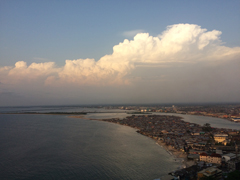
The West Point area of Monrovia, in the peninsula in the front, was devastated by an Ebola outbreak
Development without leaving no one behind
Liberia's civil conflict that lasted intermittently for 14 years since 1989 killed more than 150,000 people and displaced over 300,000 refugees. It also devastated the country's infrastructures such as roads and schools. The conflict ended in 2003, but the country was then hit by the Ebola epidemic, which generated a large number of victims and caused serious damage to the economy.
In 2006, Liberia elected the first female president in the history of Africa. And in 2018, George Weah, a former world-famous soccer player and Ballon d'Or recipient, took office as President. The country has been aiming to rebuild the nation within the democratic framework.
The living conditions of Liberia are still harsh, and the country is ranked 181th out of 189 countries on the UNDP's the Human Development Index. The Liberian government aims to develop the country up to a middle-income country level by 2030. To achieve the goal, it is working on the economic reform through investment in infrastructure, education, and healthcare, while also promoting the "Pro-Poor Agenda (Poverty Reduction)" to ensure economic development without leaving no one behind.
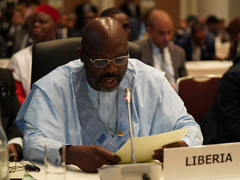
Liberia President George Weah delivers a speech at the opening ceremony of TICAD 7 in Yokohama in August 2019
Photo : Liberia Executive Mansion
Japan Freeway improves people's lives and economy
The population of Monrovia, Liberia's captial, has surged with overflow of repatriated refugees and people moving in from rural areas. Its estimated population is about 1.5 million to 2 million. As the population grows, the number of automobiles has also been increasing, causing chronic road congestions in the city.
There are two main roads connecting east and west in the metropolitan area of Monrovia. One of them, the 13.2-kilometer Somalia Drive, had only one lane on each side with deteriorated pavement, and people were suffering from constant traffic jams. JICA has widened the road into double lane on each side, and replaced and reconstructed two bridges crossing on it. Now the pavements are being reconstructed and i traffic lights and street lamps are being prepared, due to be completed by 2021.
With these works by JICA, the Somalia Drive will provide safe and smooth traffic for Monrovia citizens. It is also expected to have a great economic impact, as the road is a part of the international corridor connecting the country's largest port with rural areas and neighboring country of Guinea. To show gratitude to Japan, the Government of Liberia renamed the Somalia Drive to "Japan Freeway" this March.
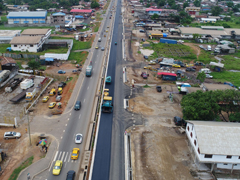
The Japan Freeway, expanded to a four-lane road and its pavement being repaired
Maternal and child health service improvement in metropolitan area
The long-time civil conflict and the Ebola epidemic in 2014 devastated the health care service, resulting in declines in health indexes. The maternal mortality rate is 725 deaths per 100,000 births (WHO, 2015), and the infant mortality rate is 56 deaths per 1,000 births (WHO, 2017), both of which are at one of the worst levels in the world.
From 2015 to 2018, JICA implemented a project to strengthen the healthcare service in Monteserrado County and assisted in building its fundamental health administration system. The maternal and child healthcare indexes need urgent improvement especially in the County, where the capital is located and one-third of the nation's population live.
Considering this situation, JICA is currently preparing the management skill enhancement project for the Montserrado County Health Team in order to improve health services delivery especially in maternal and child health. Through introducing trainings for the staff of the County Health Team to enhance its managing function and supporting its integrated supervision on healthcare services provided at health facilities, the project is intended to enhance the management capacity of the County Health Team.
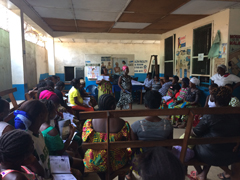
A health guidance given for expectant and nursing mothers at a public clinic as a part of the previous project
JICA Alumni Association becomes active again
More than 650 Liberian people have visited Japan to participate in JICA's training programs since JICA started technical cooperation in the country in 1976. In 2009, the JICA Alumni Association of Liberia was formed by these ex-trainees, when JICA restarted its operation in Monrovia by opening its field office, following after the period of its suspension of bilateral cooperation owing to the civil conflict. Although the association's activities had been stagnant for a while, many alumni wished to mingle with fellow trainees or start a new business with fellow alumni by making use of what they had learned in JICA training programs. These alumni led the way to reactivate the association in 2017.
The JICA Alumni Association of Liberia currently holds regular meetings, and some members participate in the clean-up campaign of Monrovia City run by the Monrovia City Corporation. This year, Monrovia City became a member of the "African Clean Cities Platform (ACCP)," an initiative started by JICA, Ministry of the Environment of Japan and other bodies to enforce waste management and environmental protection in African cities. The person in charge of waste management in the Monrovia City Corporation is a member of the JICA Alumni Association, and he participated as a presenter in the 2nd General Assembly of ACCP, which was held along with the 7th Tokyo International Conference on African Development (TICAD 7).
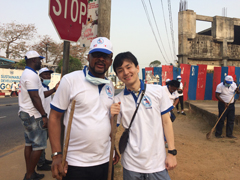
A JICA alumni and JICA staff member participating in Monrovia City's clean-up campaign




scroll